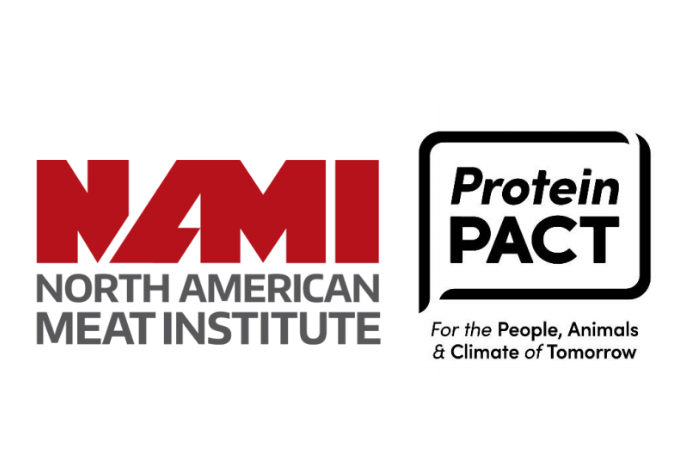WASHINGTON – A consortium of companies representing the meat and poultry processing industry committed to promoting sustainability by establishing transparent baselines and setting goals as part of the Protein PACT for the People, Animals and Climate of Tomorrow, took a significant step Nov. 9. According to the North American Meat Institute (NAMI), 100% of its members committed to greenhouse gas (GHG) reduction targets in accordance with the Paris Climate Agreement goals by 2030. NAMI said it will support members in establishing the GHG targets, which will be assessed and approved using criteria established by the Science Based Targets Initiative (SBTI).
NAMI’s latest commitments as part of the Protein PACT included the announcement of five new targets and a framework for sustainability as a stakeholder in the organization made up of 12 agricultural organizations with a common goal to accelerate momentum and verify progress toward global sustainability using science-based goals across all protein sectors. The organizations include: NAMI, the National Pork Producers Council (NPPC), the National Pork Board (NPB), the US Roundtable for Sustainable Beef (USRSB), the US Meat Export Federation (USMEF), the Beef Alliance, the Animal Agriculture Alliance, Elanco, Dairy Management, National Corn Growers Associations, iFeeder and the United Soybean Board
“Our comprehensive sustainability framework will drive momentum and generate technical support for meat packers and processors of all sizes to establish independently approved science-based targets to reduce greenhouse gas emissions while producing the leading source of safe, high-quality protein in Americans' diets, sustaining healthy animals and a thriving workforce along the way,” said Julie Anna Potts, president and chief executive officer of NAMI.
Besides assisting members with establishing goals, NAMI will collect data from member companies to establish baselines to monitor progress on those goals across categories that included food safety, human rights, labor and health and wellness.
According to NAMI, other, more immediate targets announced on Nov. 9 included:
● In 2022, companies representing 90% of meat produced by Meat Institute members will report data in the Meat Institute’s sustainability framework, with 100% of Meat Institute members reporting data on all metrics by 2030.
● By 2025, 100% of Meat Institute members who handle animals will pass third-party audits for animal care during transportation and handling and all members will require all suppliers to implement mandatory employee training and follow species-specific standards for animal care.
● By 2025, working with the US Department of Agriculture and Feeding America, the Meat Institute will measure and help fill the protein gap to ensure families in need have enough high-quality protein to meet US dietary guidelines.
● By 2030, Meat Institute members will further reduce workplace injuries by 50% (2019 baseline), on top of the 75% reduction achieved from 1999-2019.


